Added Insurance When Renting a Car for Lyft Rideshare
👉 Tip: the most important tools during tax season are TurboTax to file your taxes and a mileage tracking app to keep track of your miles! And if you want to use a Turbotax alternative, then check out H&R Block.
One of the things a lot of new drivers for the best gig jobs and food delivery services overlook when they're just getting started is taxes. Taxes as an independent contractor might seem scary, but they're actually pretty simple. Today, we're going to answer all the questions you may have to make sure you maximize your deductions and minimize your taxes paid.

This guide is going to help you with your 2020 taxes (the taxes you will file this year) and there are a few noticeable changes from 2019 so pay attention!
We will be updating this article throughout the 2020 tax season, so make sure to bookmark this and save it as you go through your taxes this year!
Looking for tips on how to file your delivery taxes instead? Check out our guide to delivery taxes!
Although this information is for 2020 , it is still good information to know but consult with a tax expert for the most up to date tax information.
Every year by the end of January, Uber and Lyft send out 1099s for the prior tax year that detail how much you made, what fees they took out and the miles you drove. And since drivers are independent contractors, all that means for your taxes is that you'll have to file a Schedule C in addition to your 1040.
Uber and Lyft have been sending out tax summaries to drivers, so if you haven't received yours by the end of January, you should reach out to them directly (contact Uber here and contact Lyft here).
So let's get started and see how to file your taxes as a rideshare driver.

1099-K vs 1099-NEC
Uber and Lyft both consider themselves third party payment processors. I'm familiar with this term because I used to accept Paypal payments with one of my old businesses, and only in years where I made over $20,000 and did 200 transactions would I receive a 1099-K.
A third party payment processor is essentially a company that facilitates payments between consumers and business owners. So that's why you see companies like Paypal, Amazon Payments and Square label themselves as third party payment processors.
Now obviously Lyft and Uber do a whole lot more than facilitate payments, but this is the distinction they've decided to go with. This won't affect the amount you pay in taxes, but it does mean they'll report gross income and you will have to subtract out the fees/commissions they charge.
Ready to file? Click here to purchase TurboTax or click here to read our review of FreeTaxUSA
Uber's 1099s
New for 2020:
You should receive these tax documents from Uber:
- A tax summary: an unofficial document produced by Uber and provided to every driver/deliverer. This tax summary will have a breakdown of your annual earnings and business-related expenses that may be deductible.
- 1099-K: An official IRS tax document that includes all on-trip gross earnings. Only drivers who made more than $20,000 in passenger/delivery payments and provided at least 200 rides/deliveries will receive a 1099-K.
- 1099-NEC:Form 1099-NEC is not a replacement for 1099-MISC. It's only replacing the use of 1099-MISC for reporting independent contractor payments. Drivers and delivery people who received $600 or more of these types of payments will receive a 1099-NEC. There is no ride or delivery threshold to receive this document.
Note: Certain states have implemented lower reporting thresholds. Therefore, you might receive a 1099-K for amounts that are below $20,000.
Similar to last year, all Uber drivers will receive a tax summary. The information shown on the Uber Tax Summary is your number of completed trips along with your total online miles (not hours). It also breaks down your gross earnings plus your total additional earnings (including in-app tips); your expenses, fees and taxes (that Uber tracks — not including your personal expenses such as gas, maintenance, etc.); and your net payout which would be the amount that was deposited into your bank account each week (or through cashing out) throughout the year.
When will you receive your Uber tax summary in 2021? According to Uber, "You'll receive an Uber tax summary on your driver dashboard before January 31, 2021." If you haven't received it by then, contact Uber.
Below is an example of what this looked like in 2019:
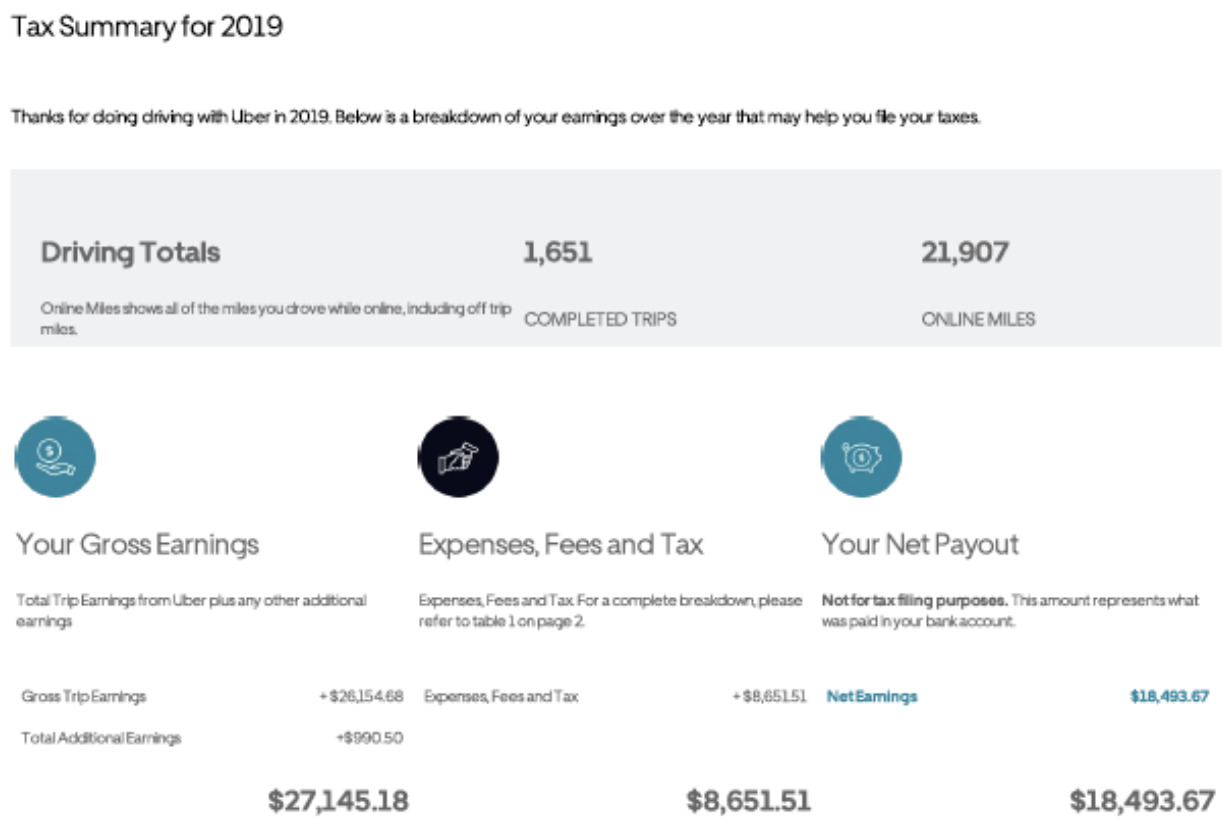
Example of Uber's 2019 tax summary
Now where it gets confusing is with the 1099-K, since Uber reports gross fares including all of their fees/tolls/etc. All you need to do though is combine the number on your 1099-K and/or 1099-NEC, and that is the total that will go down as your income on your Schedule C.
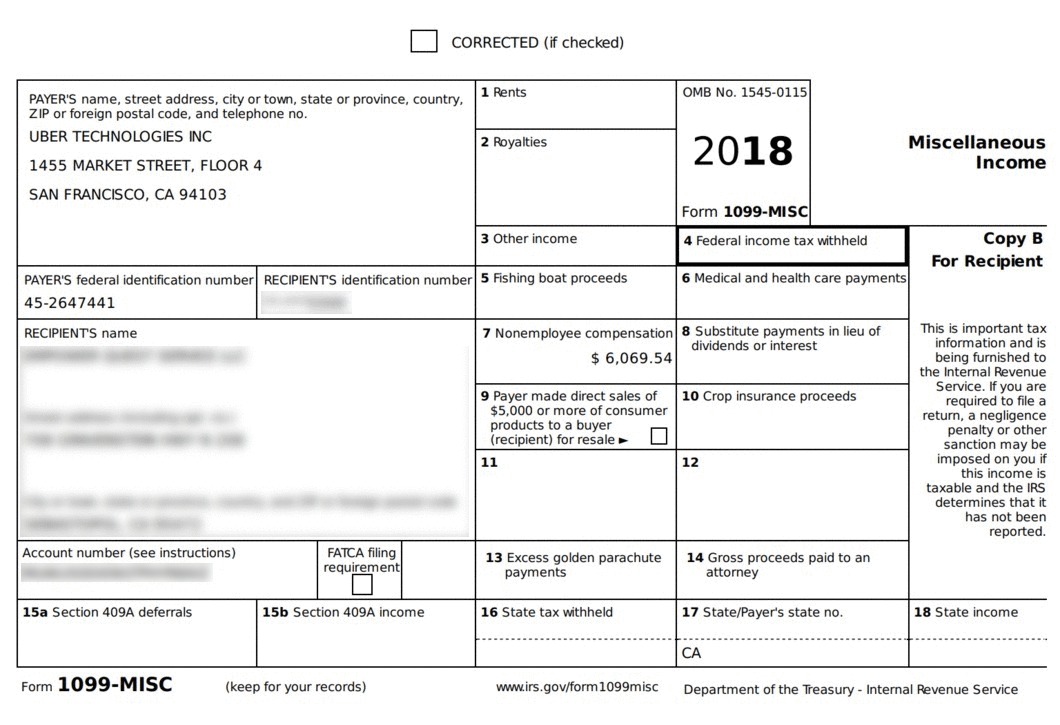
One driver's 1099-MISC from Uber
Now I know what you're thinking. That number is a lot higher than what you actually made, and you're 100% right. In order to get your true earnings, you will want to subtract all of the expenses, fees and tax (you can find your tax summary here on the Partners Platform).
Uber breaks this out for you in the tax summary (image above). Uber is also offering a taxes FAQ page you can access here.
For 2020 taxes, Uber is continuing its partnership with TurboTax. TurboTax will be offering free and discounted services to drivers and delivery partners. You can find out more here.
Offers must be accessed through the Tax Information tab on partners.uber.com.
Need more help? Subscribe to our YouTube channel to be notified of our next YouTube live. We'll be tackling all of your questions related to rideshare taxes, filing, deductions and more. Subscribing to the RSG YouTube channel is easy – just click here .
All set to file?
- Click here for a discount on H&R Block
- Or purchase TurboTax here
- Or use FreeTaxUSA here
Lyft's 1099
The Lyft Tax Summary is very similar. They do outline at the top when and if you can expect a 1099-K and/or 1099-NEC:
"Tax info for the 2020 tax year will be available in the Tax Information tab in your Dashboard by January 31, 2021.
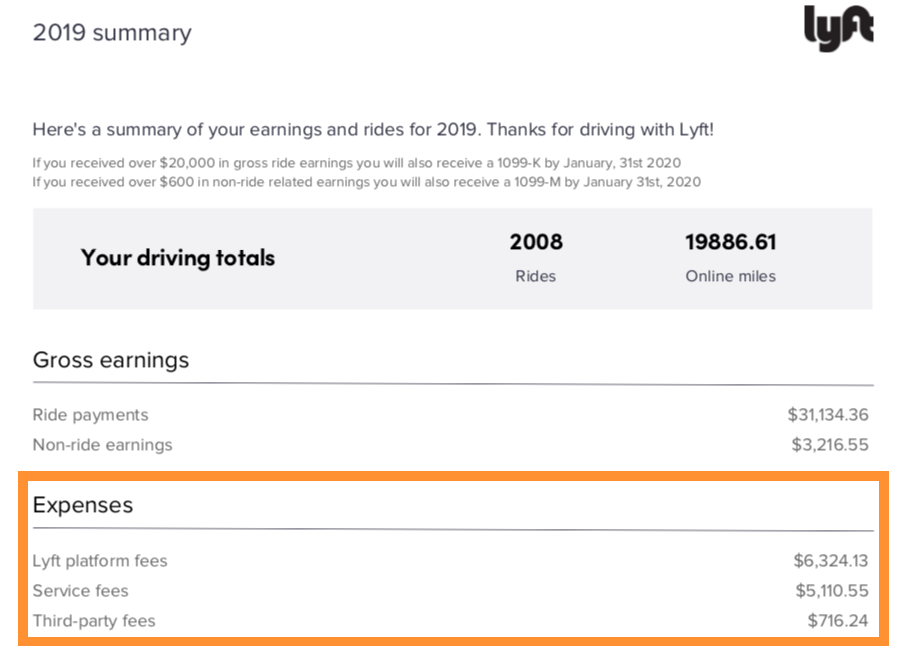 If you earned less than that, you still need to report your earnings as outlined on your tax summary, but you will not be getting an official tax document from Uber or Lyft. If you drove very infrequently, you may need to hunt on the app for your tax summary instead of receiving an email with the information.
If you earned less than that, you still need to report your earnings as outlined on your tax summary, but you will not be getting an official tax document from Uber or Lyft. If you drove very infrequently, you may need to hunt on the app for your tax summary instead of receiving an email with the information.
Both breakdown what the expenses section covers of what they are reporting, namely the booking fee, airport fees, instant pay or express pay charges, and service fees that Uber and Lyft take out of your earnings upfront.
This is what you can expect to receive from Lyft for the 2020 tax year:
1099 forms
Some drivers qualify to get a 1099-K or 1099-NEC from Lyft. If you don't see a 1099 form in your Dashboard, you can use your Annual Summary to file your taxes.
Here are the requirements to get a 1099 for the 2020 tax year:
1099-K: At least 200 rides and at least $20,000 in ride payments from passengers in the year.
-
Vermont, Massachusetts, and Virginia: You'll get a 1099-K as long as you earned at least $600 in ride payments.
-
Illinois: You'll get a 1099-K as long as you earned at least $1,000 in ride payments.
1099-NEC: At least $600 from activities other than driving in the year (like bonuses).
You may get both a 1099-K and a 1099-NEC, depending on how much you earned.
In previous years, drivers would receive a 1099-MISC instead of a 1099-NEC.
In the past, Lyft included this Tax Prep Checklist that can come in handy if you're not sure what you can deduct from your rideshare earnings:
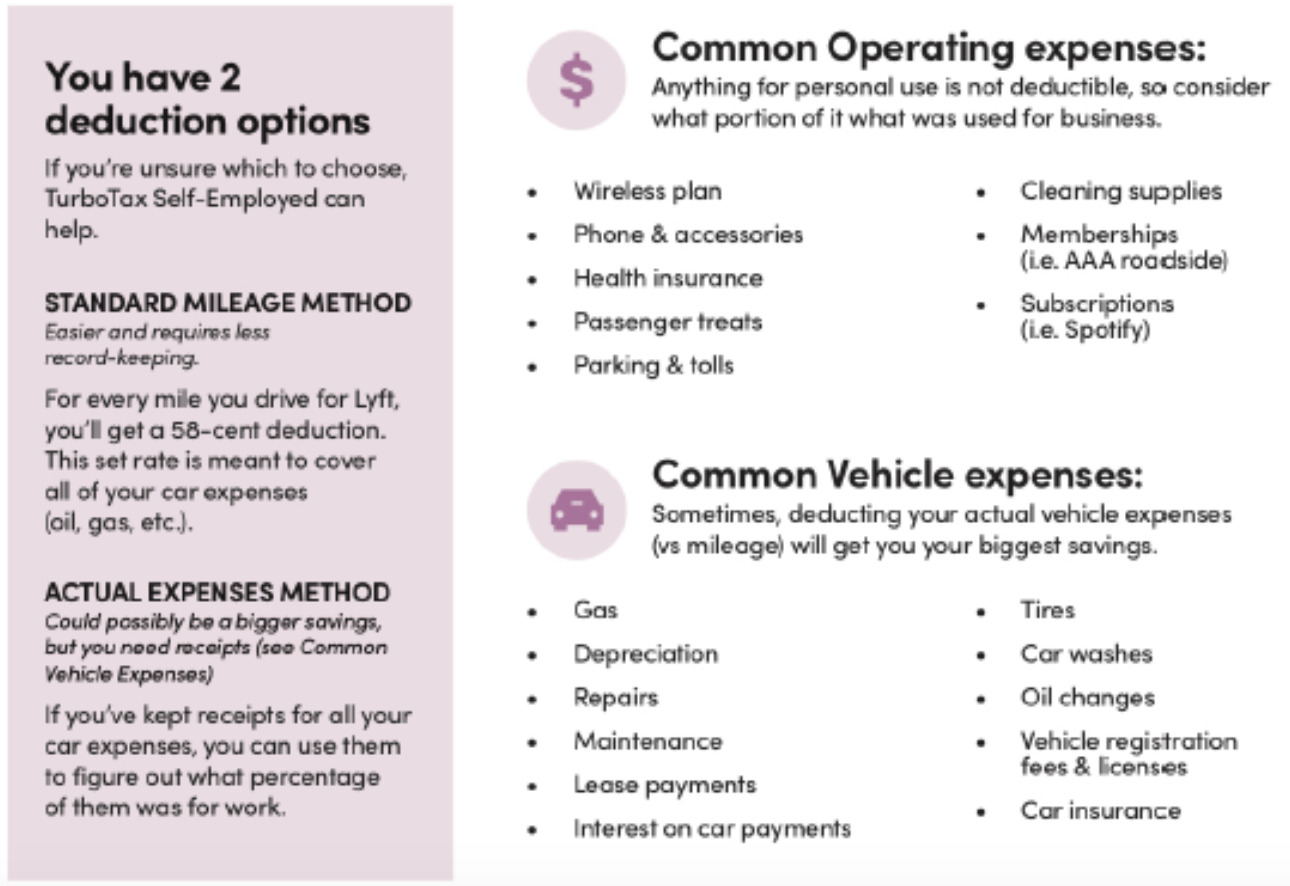
Lyft Tax Prep Help
To print out your Lyft 1099 forms, visit your driver dashboard here and click to "Tax Information".
Lyft is also offering deals with TurboTax:

It would be a good idea to research the two to see if you're getting the best deal, though it's likely they will both be offering the same discounts. Learn more about discounts and other tax questions you might have at Lyft's Tax Site . Lyft is also offering additional support at their local hubs. Find your nearest hub here .
All set to file? Click here to purchase H&R Block or TurboTax here.
Keeper Tax and FreeTaxUSA are also really great options!
Driving For Lyft And Uber
If you've been following my advice over the past year, you probably drove for more than one TNC last year. If that's the case, you still only have to file one Schedule C, but you will need to combine the income from Lyft and Uber on your Schedule C and combine the commission and fees from Lyft and Uber too. Just make sure you account for the correct expenses as detailed above.
Since Uber and Lyft are all considered the same 'rideshare driving business', you only need to fill out one Schedule C. If you also did delivery, technically you're supposed to do a separate Schedule C but I'd speak to a CPA about that. You could probably argue that since Uber now offers UberEats for example, your business is really more providing 'logistic services' than rideshare or delivery type services.
Didn't drive for delivery in 2020 but thinking of it in 2021? Find our list of the best food delivery services to work for here.
Changes from Prior Years
The 2018 Tax Cuts and Jobs Act brought on many major changes to both business and personal income taxes. Rideshare drivers are affected mostly by the business changes since driving for apps like Lyft and Uber is treated as independent contractor work. Here are some things to pay attention to.
The 20% Pass-Through Deduction
This is meant to give small business owners a boost. That includes freelancers and self-employed people like rideshare drivers who usually receive a 1099. It's one of the biggest changes for rideshare drivers during the 2018 tax year.
If your income is less than $163,300 for the year ($326,000 if married filing jointly), you can get a deduction worth up to 20% of your total profit.
As NOLO explains it:
Example: Tom is single and operates his public relations business as a sole proprietorship. His business earns $100,000 in qualified business income during the year. His total taxable income for the year is $120,000. His pass-through deduction is 20% x $100,000 QBI = $20,000. He may deduct $20,000 from his income taxes.
A note from Starzyk CPA:
There is actually one big item that affects the calculation. It's no longer simply 20% of business profit. Drivers would take their net profit and subtract their deduction for 1/2 self-employment tax (and self-employed health insurance and retirement plan contributions if they apply) and then multiply that number by 20% to figure the deduction.
New for 2020 Rideshare Tax Filing
Something new to look out for with the 2020 filing is the updated inflation-adjusted 2020 tax brackets, which look like this:
 Your tax bracket may have changed from 2019 to 2020 even if you're earning the same amount this year that you did last year.
Your tax bracket may have changed from 2019 to 2020 even if you're earning the same amount this year that you did last year.
What about the stimulus checks? Are they taxable?
No, the $1200 and $600 per person checks that many of us received are not taxable. They are a 2020 tax credit we were able to obtain early.
Are PPP loans taxable?
No, PPP loans are not taxable. Learn how you can qualify for a PPP loan here.
What If I Only Drive Part-Time?
If you're doing rideshare part-time on top of another job, this deduction also only applies to your rideshare income (and any other "gig work" on a 1099) and not the wages from your job.
For example, if you make $50,000 a year at a job that you get a W-2 from plus $5,000 from rideshare driving, then you'd get an additional deduction of $1,000.
Standard Mileage Deduction Increases to $0.575/mile
The 2020 standard mileage rate is 57.5 cents per mile for business uses , which is down from 58 cents from 2019.
Keep in mind, if you chose to deduct your actual expenses the first year you owned your vehicle, you must continue to deduct your actual expenses, even if you'd get a better deal with the standard mileage deduction. On the other hand, If you chose the standard mileage deduction the first year you owned your vehicle, then you can choose which deduction you want to take each of the following years until you no longer own it.
For 2020, the mileage reimbursement rate went down a bit to 57.5 cents per mile so make sure you do a good job tracking those miles. We recommend Stride Tax (affiliate link).
Luxury Vehicles
Rideshare apps give luxury car drivers the option to earn more money. In addition to normal depreciation, luxury cars now have bonus depreciation because of the new tax bill. If you own or lease a luxury car, now you can deduct $10,000 plus $8,000 of bonus depreciation if eligible (maximum possible total of $18,000) in the year you first start using it for ridesharing and $16,000 in the second year.
For reference, those figures come from Table 2 on the bottom of page 5 of this PDF (click here). Table 3 would be without bonus depreciation.[Editor's note: Thank you to CPA Joe Starzyk and reader Wally for pointing this out to us!]
You can read more about the 2018 Tax Cuts and Jobs Act, including how it affects tax brackets and more, here.
Deductions
Standard Mileage Rate
We've talked about standard mileage rate vs actual expense method before but for most of you, the standard mileage rate will likely make more financial sense (and it will be a lot easier). Just note that if you opt for the standard mileage rate, you must choose to use that in the first year the car is used as a business. In later years, you can then choose either method.
For 2020, the standard mileage rate is 57.5 cents per mile and that basically includes all of the costs to operate your vehicle: gas, depreciation, oil changes, maintenance, repairs, etc.
Remember, the actual cost to own and operate your vehicle is not .575 cents per mile though. That is the deduction amount that you will get from the IRS. Your actual cost should be a whole lot less, especially if you want to be profitable as a rideshare driver.
Related: Make Sure You Don't Miss Out on These Important Deductions!
Uber and Lyft provide the total number of miles you drove while online in your tax summary. You can use this number but it may not include all of your deductible miles if you are doing business related activities with the app off (driving to driver meet ups, re-positioning with the app off, commuting, etc).
Additionally, if you drive for both Uber and Lyft at the same time, you'll want a separate mileage tracking app otherwise you have to break down all your miles to make sure you don't count any periods twice (since there are times where you'll be online without a Lyft or Uber passenger)
Documentation and records are extremely important when it comes to filing your taxes. If you find it difficult to keep records, I recommend using one of these mileage trackers (some of the mileage trackers here also help you track car washes, health care, and more!)
Tracking Mileage
If you're only going to track one thing, make sure you are tracking your miles! A full-time rideshare driver will easily put 1,000 miles a week on their car which translates into a $575 deduction each week or $29,900 through the year (which is pretty massive).
There's some confusion around which miles you can deduct as a driver, but personally, I deduct all the miles from the second I leave my house until I arrive home. Especially now that you can turn on the destination filter if you commute in/out of the city.
Related: What Can Drivers Do If They Forgot to Track Their Miles?
Even though Uber and Lyft both show all miles online now, it's not a substitute for a proper IRS approved mileage log. You'll still want to consider using a third party mileage tracking app like Stride Tax. You can find a full list of mileage tracking apps here.
Related: How to Use Destination Filters to Increase Your Profits
Other Deductions
- Training materials and tools like Maximum Ridesharing Profits (our video course), The Rideshare Guide (our book), etc are all deductible.
- Other expenses like car washes, cell phone use, candy/water/etc, Spotify membership, Bluetooth, Trunk Organizers, etc may be deductible too as long as they are 'ordinary and necessary'.
- The only thing you'll need to watch out for with deductions is a cell phone that may be used for personal and business use. Generally, you will need to allocate between personal/business use, so if you use the phone 50% of the time for business and 50% of the time for personal, then you would only be able to deduct half of the cost of the phone and monthly subscription.
Related: A Pro Answers Your Top Rideshare Tax Questions
How Do Most Drivers File Their Taxes?
If you're wondering what your fellow drivers do when they file their taxes, here are the responses from a survey I sent out:
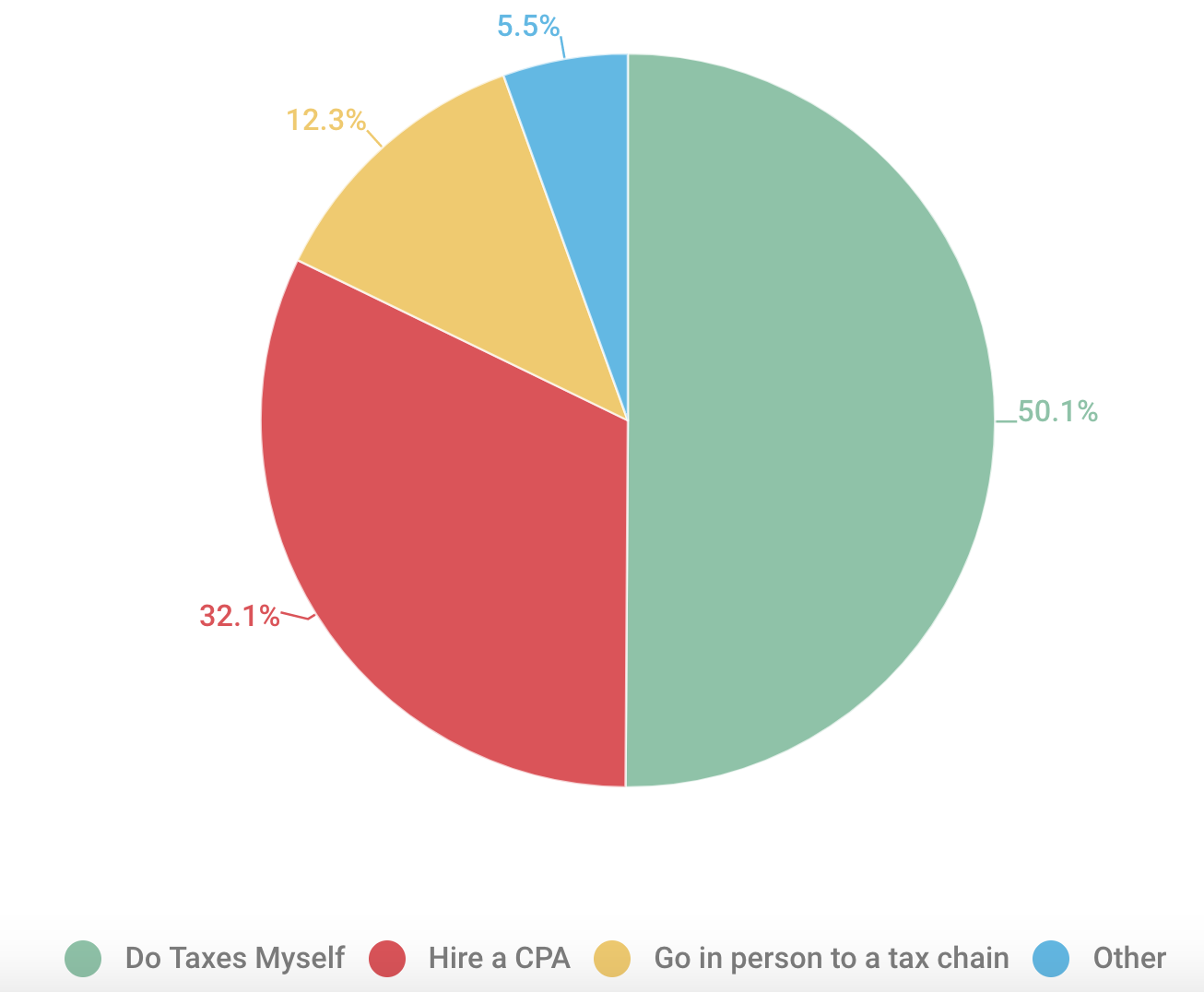
Click here to purchase TurboTax.
Prefer a TurboTax alternative? Click here to purchase H&R Block or FreeTaxUSA here.
Filing Your Own Taxes
Thanks to the simple processes of e-filing, filing your own taxes is now easier than ever. There are many affordable programs to help walk you through the process step-by-step and many options also provide professional support and assistance from real CPAs.
Two of the most popular DIY tax filing softwares are H&R Block and TurboTax.
Hiring a Rideshare CPA
Hiring a CPA (certified public accountant) to file your taxes is one of the safest routes to take because accountants know the tax code and some might even specialize in what you are looking for.
For example, if you are a contractor, hiring a CPA to help you manage your tax documents and file each year is a safe move especially if you have a very complex situation that requires an expert's attention.
Generally, using a CPA to file your taxes can run you anywhere from $250 to $400 depending on your situation so it's one of the more expensive options. The benefit of having a CPA is knowing that you can go back to the same person year after year and they'll keep track of all your information. You can ask questions whenever you want and also get reminders to make quarterly estimated tax payments.
When determining the right CPA, you want to try to work with someone who is familiar with your situation and either specializes in taxes for rideshare drivers or has has experience working with other rideshare drivers. It's best to work with someone who not only knows the tax code well but is also up-to-date on all the deductions drivers can take and h w to file for them correctly. You can also request references and ask plenty of questions to ensure you're making the right choice.
Some important questions to ask your rideshare CPA include:
- What does your service include and what are your fees?
- How do you bill for your services?
- What is the best way to communicate with you? Online, by email, in person, or other means?
- What specific documents do I need to send you in order to get my estimates and file taxes by the deadline?
- Can you send me regular reminders of when quarterly estimates are due?
- Can you represent me if I get audited by the IRS?
- Do you have references?
If you're going to go the CPA route, I recommend you find someone who's knowledgeable in small business and/or rideshare drivers. There are hundreds of thousands of rideshare drivers these days, so it shouldn't be too hard to find a CPA who is familiar with Uber.
If you're concerned about how to avoid an IRS audit as a rideshare driver, you should work with a rideshare-familiar CPA. Here's one we recommend.
Best Tax Softwares
1. TurboTax
TurboTax is one of the most popular tax filing programs and with good reason. They offer a 'Self Employment' tax filing program as well as a wealth of information and tools like their Tax Bracket Calculator and Self Employed Expense Estimator.
Both Uber and Lyft offer Turbo Tax discounts to drivers who qualify on the respective partner dashboards. Otherwise, the price is $90 to file or $170 to use Turbo Tax Self Employed Live.
The only difference between the two versions is that the Live tax filing program includes unlimited tax advice and answers from real CPAs.

Again, you can find a ton of information on the site for free. For example, on TurboTax's self-employment page, you can click your industry from a drop-down menu and learn about which deductions you may qualify for.
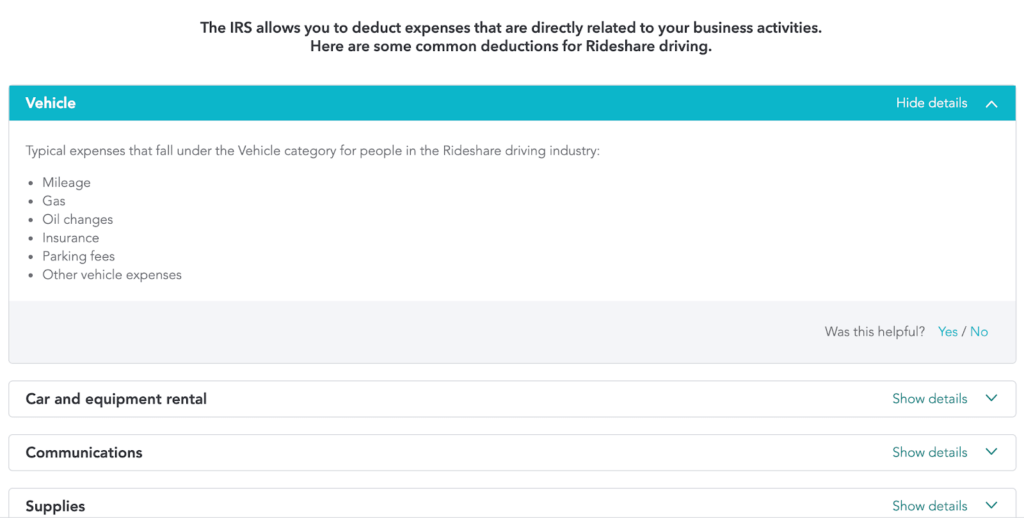
If you use Quickbooks Self Employed to track mileage and expenses throughout the year, you can easily import this data to TurboTax as you prepare your taxes.
Another thing I love about TurboTax is that every detail is carefully reviewed. They guarantee their calculations are accurate, which is super helpful for beginners who are new to e-filing.
In fact, if you ever do get audited by the IRS, TurboTax will provide free guidance from a professional and pay any IRS fees, so there's very little risk on your end.
Get started with TurboTax using our referral link here .
Here's how to file your taxes using TurboTax:
2. H&R Block
H&R Block has tax filing offices all over the country, but you can probably spend less by filing taxes online or downloading their software program.
As a rideshare driver, you'll want to use their Premium Online tax filing service for $49.99, or Self Employed Online service for $ 84.99. Both options would also include an additional $36.99 for the state taxes.

H&R Block also partners with Stride to help you easily import your mileage and business expenses.
While their premium package includes technical assistance by phone, it doesn't include importing your Uber driver tax information. I'm not sure if they'd allow you to do this manually, but to be safe, using the Self-Employed Online program will allow you to import your 1099 forms from Uber and Lyft.
Just like TurboTax, H&R Block offers a maximum refund guarantee and a 100% accuracy guarantee. They also provide free audit guidance and support.
Get started with H&R Block using our referral link here !
3. FreeTaxUSA
FreeTaxUSA is an IRS-approved e-file provider and a top-rated tax filing software program. As their name suggests, you can file advanced and simple returns for free no including state fees.
As a rideshare driver, you'd be looking at their free advanced tax filing service. Here is a snapshot of all the situations that qualify.
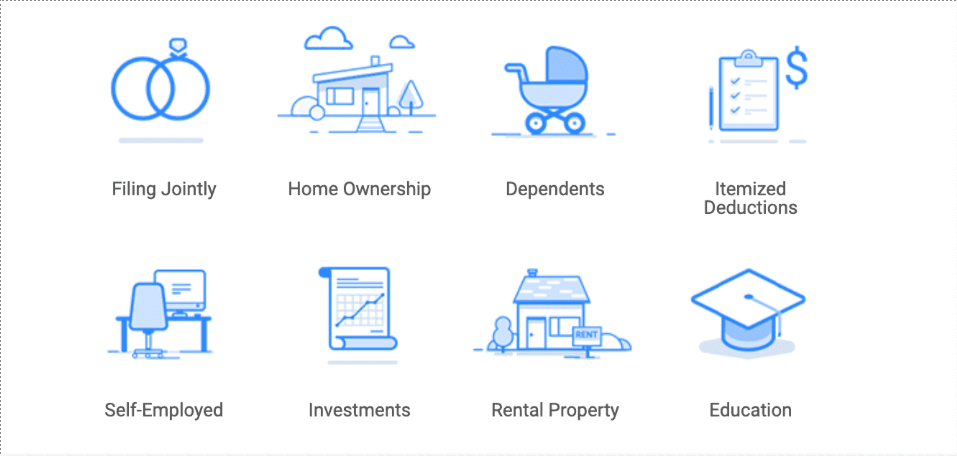
You can import data from prior tax returns done with TurboTax, H&R Block, and Tax Act and their system will check for over 350 different tax credits and deductions that you may qualify for. Since FreeTaxUSA doesn't charge for advanced tax returns for contractors, you may be wondering what the catch is.
While they don't charge for Federal returns and also offer a 100% accuracy guarantee, the company does charge $12.95 for state returns and other additional services they sell. For example, you can pay an additional $6.99 for priority support, audit assistance, amended returns.
However, I did some digging on and the IRS website I see they recommend FreeTaxUSA for a free federal return if:
- Your adjusted gross income (AGI) was $72,000 or less
A lot of other sites like TurboTax will provide free federal returns under these conditions as well since it would likely be a 1040 EZ form, but perhaps TaxFreeUSA waives the fee for all Federal returns regardless of these things.
Get started with FreeTaxUSA here .
4. Tax Act
Tax Act offers self-employed tax filing services for $74.95 online and $124.90 to download their software. You can easily import things like income, expenses, depreciation and more while receiving step-by-step guidance for a maximum refund.

While Tax Act says you can complete your federal return in just minutes after importing all your information, they offer year-round tax support and planning along with 7 years of access to a digital copy of your return.
Like TurboTax and H&R Block, Tax Act offers multiple tools and resources to make the tax filing process smoother and more understandable.
Don't forget – Rakuten users can save money and get cash back when you use Tax Act through the Rakuten portal ! Save 5%+ using Rakuten – sign up here .
 Get started with Tax Act here!
Get started with Tax Act here!
5. Liberty Tax
Liberty Tax has their own tax filing online service that is affordable for freelancers and contractors. The best package for rideshare drivers is the Premium service for $44.95.

The Premium package is designed for anyone with self-employment income, business deductions, unreported tips and an overall more complex tax filing system. You'll decide what aspects of a return you want to work on and can always send your return to a local office for an expert to complete if need be.
Liberty Tax offers all the standard accuracy guarantees, support, and audit guidance along with the ability for you to send your tax return to a local office for a free double-check.
Liberty Tax has an advanced software system that is great for someone who's been e-filing on their own for a year or two.
One thing I really appreciate about their system is the safeguards they put in place to warn you if you input information that could trigger an audit so you can understand more about how that works.
Get started with Liberty Tax here .
The Top Tax Programs for Uber and Lyft Drivers
Filing your own rideshare taxes doesn't have to be a pain with these popular tax filing programs.
Our top choice for drivers hands-down is TurboTax because it's an easy-to-use system that can potentially be free or discounted for drivers. The fact that you can input expenses with Quickbooks Self Employed is another perk that will make filing taxes super easy.
Local Tax Prep Office
Another option you have when filing your taxes is to go to a local tax preparation office. There are many popular franchises with trained accountants and tax preparers who can help file all your tax documents.
While the staff at local tax preparation offices are often trained and certified, all of them might not be accountants and their experience may be varied. Also, you probably won't get to choose who you work with to file your taxes unless you know someone personally and request to meet with them.
How to Avoid an IRS Audit
What is Your Likelihood of Getting Audited as an Uber or Lyft Driver?
According to Greg Iacurci's article on CNBC, "The IRS audited roughly 1 out of every 220 individual taxpayers last year." However, according to the article, "wealthy Americans are much more likely to be audited than low- and middle-income taxpayers."
If you're not a wealthy Uber or Lyft driver, it doesn't quite mean you're out of the woods. There is still a chance you could be audited!
One thing you can do to help lower the likelihood of getting audited is making sure you're not throwing up certain red flags when you go to file your taxes.
Be Careful When Filing Your Taxes
As independent contractors, most drivers will file a Schedule C with info from their 1099s because they made enough to get one from Uber or Lyft. The average threshold for receiving a 1099 is typically $20,000 earned.
According to Stride, "for individuals filing with a Schedule C — the necessary form you must use if you have 1099 income — your odds of getting audited jump to 2.4% if you earn from $25,000 – $100,000."
What some people don't seem to realize is that even if you don't receive a 1099, you'll still need to pay taxes on that income. Don't skip out on it just because you didn't earn enough for Uber and Lyft to send you the paperwork.
Even if you don't get a 1099, both Uber and Lyft will provide you with year-end tax statements that will show how much you earned on each platform, the fees Uber and Lyft have taken out.
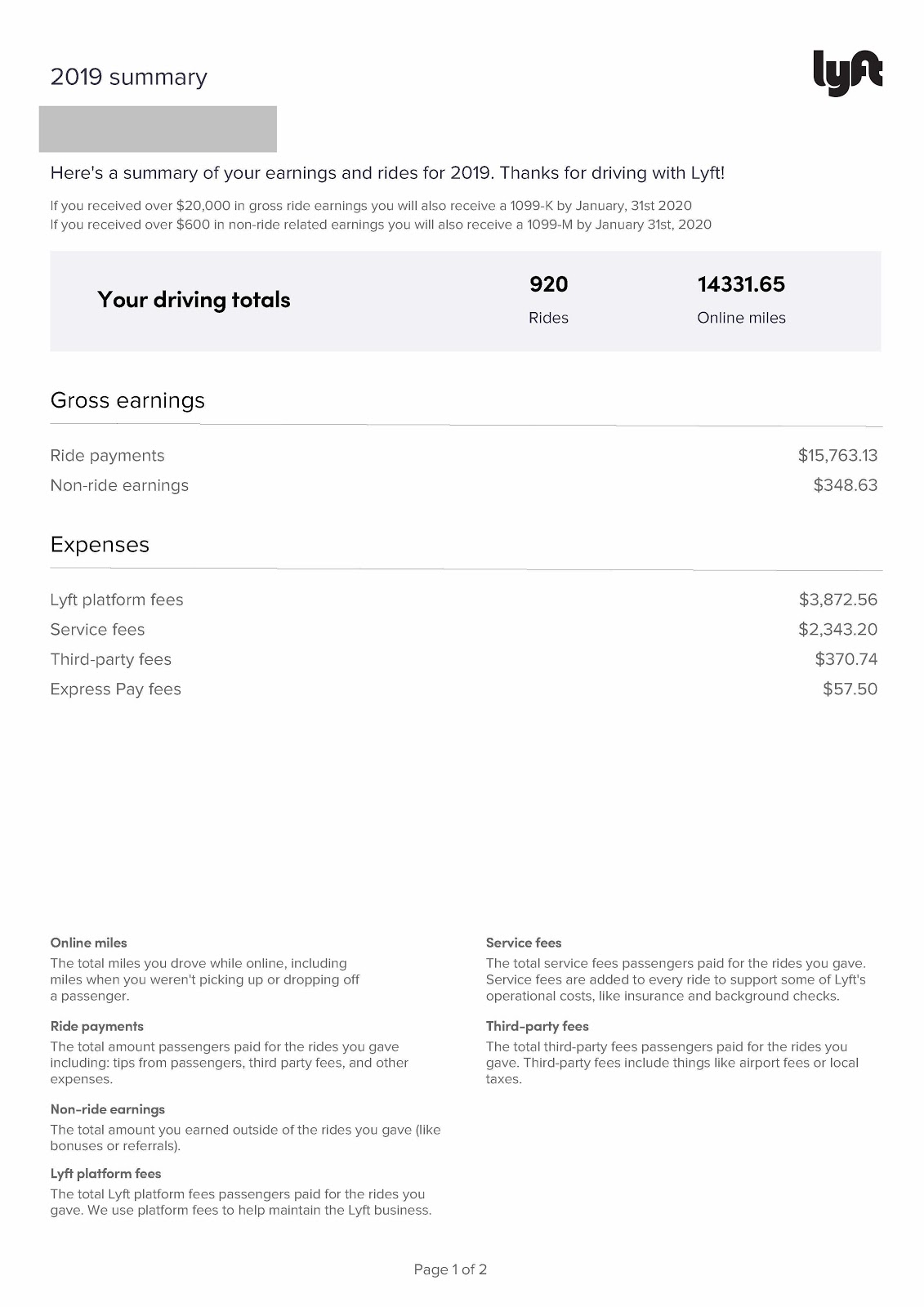
Lyft tax summary for 2019 earnings
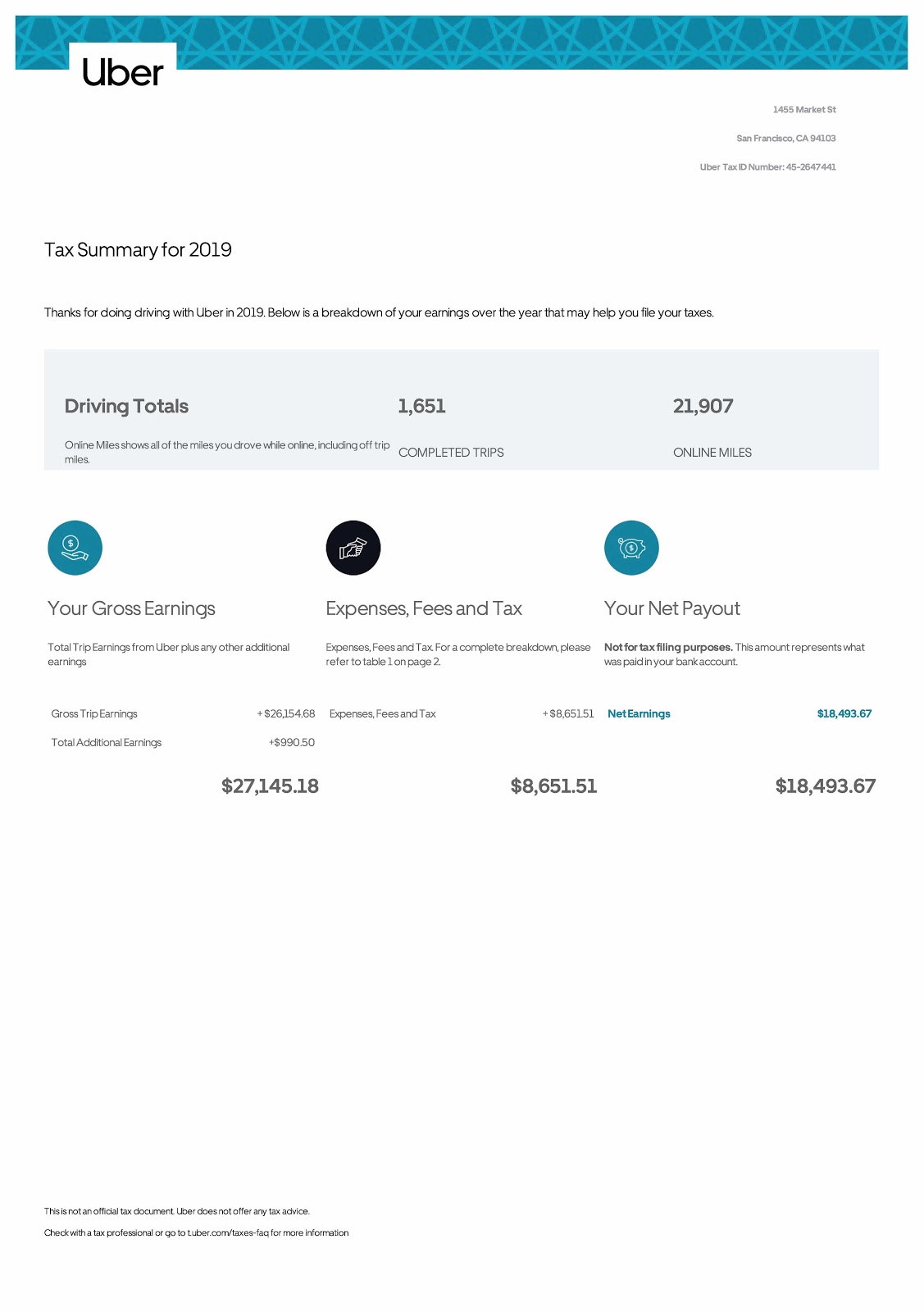
Uber tax summary from 2019 earnings
Despite having the total number of miles you've driven stated on these forms, you still need documentation in case you get audited.
It always makes sense to track your earnings and driver expenses, regardless of what Uber and Lyft do or don't send you. Create a simple tracking spreadsheet – we show you how to do it here.
Can't get all of your earnings from Uber, Lyft or another gig company? Check your bank statements! Depending on how you have your earnings deposited, you should be able to chart your pay through your bank account (use the search feature to go back throughout the whole year of 2020, if you worked for a gig company beginning in January 2020).
Gather All of Your Documents
It's a good idea to use an app like Stride or TripLog to monitor and record your on-app driving. If you need help choosing which app is best for you, check out our Mileage Tracker Review article. One driver from Oregon who wrote to us about being audited stated:
"I have supplied them with all my Uber/Lyft documentation and daily driving logs which include begin and ending odometer readings for each day. They are now asking for a narrative of all my miles between drop-off and the next pick up to include where I went, why I picked where I did if sitting in a parking lot, and the amount of time between the requests."
That is a lot more detailed than anyone would have imagined the IRS would ask for. Who writes down why they decided to park in a mall parking lot to wait for their next ping or records how much time there was between dropping of someone and getting your next ping?
According to the IRS, when you receive a notification of being audited, "We're asking for information to verify items you claimed on your tax return. You must send in the documents needed to close your audit or we will send you an audit report showing our proposed changes."
After you send in the documents asked for by the IRS, "If you sent us copies of documents that proved you were eligible for items you claimed on your tax return, we will send you a notice to let you know your audit is closed. If we held your refund, you should get your refund in eight weeks if you don't owe other taxes or debts we're required to collect."
The IRS website also features a section called, "Your Rights During an Audit":
Your audit packet includes:
- Publication 3498-A, The Examination Process (Audits by Mail) PDF. This publication covers what happens during an audit, your rights during the audit, and your rights to appeal the results of the audit. It also lists more resources to help you.
- Publication 4134, Low Income Taxpayer Clinic List PDF. Low-income taxpayer clinics (LITCs) aren't part of the IRS, but an LITC may help you with an audit, an appeal, or collection issue for free or for a small fee.
- Publication 1, Your Rights as a Taxpayer. This publication informs you of your rights and includes information on the audit process as well as the collection process.
If you're being audited, be sure to read these to make sure you understand your rights and what steps you can take to appeal if you feel the need to. It even includes a way for you to get help with your audit if you need it.
It's likely that the driver who reached out to us got a notification stating there was something wrong with his Schedule C or something the IRS wanted to take a closer look at with documentation to back up the claim.
The IRS states, "When your tax return is selected for audit, you must send copies of your records that show the gross receipts and business expenses claimed on your Schedule C.
- Gross receipts are the income from your business. Proof of your gross receipts includes cash register tapes, bank statements, bank deposit slips, receipt books, sales invoices, credit card charge slips, and Forms 1099-MISC.
- Business expenses are the costs paid to carry on your business and proof of your expenses includes canceled checks or checking account statements which clearly show the expenses paid, cash register tapes, account statements, credit card sales slips, and invoices."
To see what the IRS expects of you for record-keeping as a business owner (which is what independent contractors are considered), check out this section on their website called Publication 583 (01/2015), Starting a Business and Keeping Records.
If you're claiming your new dash cam as a business expense, you'll want to hold onto the receipt for it in case the IRS comes asking about it. Anything else you mark as a business expense would need the same documentation. If you claim something on your taxes, you need to be able to back it up with evidence.
If you use a service like TurboTax, it shows you before you submit your taxes if you have a high chance of being audited.

If you do have a higher risk, you might want to go through it then and fix whatever the issue may be to try to avoid being audited, which is a much more complicated process than fixing a portion of your taxes upfront.
If you don't feel comfortable doing your own taxes, then have a professional prepare them for you. This is the more expensive route to take, more often than not, but you'll have them able to help you out if you run into issues from the IRS. A professional tax preparer may also help you find deductions you wouldn't find on your own.
I have a professional tax preparer since my husband and I have our own business, do rideshare, do freelance writing and a W-2 job. It's just easier than trying to sort through it all ourselves.
It actually saved our skin a bit. The first time we filed as a business, we accidentally put a number in the wrong box. If the IRS had caught it and audited it, it could have been a much bigger hassle. Instead, our tax guy caught it and said, "Let's take care of this now."
We ended up owing, but we're glad to have taken care of it at that point instead of raising a red flag to the IRS.
Avoiding Red Flags
1. Reporting income that doesn't match your tax documents
If you report more income or less income than what Uber and Lyft submit, that will throw a red flag up for the IRS. Even if you just have your tax statements and not the 1099s, you'll want to report the correct income from those.
2. Deducting personal or business mileage that you can't prove
You need to be able to prove every penny that you're claiming. You won't have to submit that information upfront, but you'd better be able to provide evidence when and if the IRS asks. Keep in mind, you can't take the standard deduction and deduct expenses as well. Choose one or the other.
The standard deduction includes wear and tear on your vehicle. If you claim the standard deduction, you can't also submit for having to replace your tires or the cost of your oil changes.
3. Deducting meals that aren't for business
In order to deduct meals, you need to be with a client or customer or someone related to your business and talk business with them. Your sandwich from the while you're out doing Uber or Lyft does not account as a business meal. Don't make the mistake of claiming things as business expenses if they are not.
Readers, do you now have everything you need to go out and do your own taxes? Are there any tax questions you still have or things I missed?
Disclaimer: This article is meant for informational purposes only! You should talk to a CPA about your own individual tax situation or pay a licensed professional.
-Harry @ RSGSave

Save
FAQ
Can I deduct all my online miles?
One thing all CPAs agree on is that you can deduct all the miles while you have a passenger in your vehicle (Period 3) or are driving to pick up a passenger after you've accepted a request (Period 2).
I personally also deduct all the miles I drive during Period 1, which is when I have the app on and am waiting for a ride request. These miles could be when I'm moving to a location with a better chance of getting a ride or even have the destination filter on.
I also deduct all the miles I drive when I'm offline but still working: ie driving to meet up for lunch to talk shop with other drivers, driving to Best Buy to get a new dash cam, etc.
Mileage is a huge deduction and there are really a number of ways you can rack up the miles to maximize your deduction. I recommend using Stride Tax to track your miles as it's a free app for iPhone and Android and the reports from Uber and Lyft will not give you all of your deductible miles.
I forgot to track my mileage! What can I do?
First of all, don't panic! Many drivers have faced the same situation of not completely tracking their business miles or simply not knowing what to track.
Fortunately, rideshare drivers are in a good place when it comes to finding extra evidence. Since Uber, Lyft, and other rideshare companies keep pretty thorough records of your activity, rideshare drivers have access to more corroborating evidence than most independent contractors.
We have an easy list of steps you can take to figure out your mileage for the year here.
What about health insurance?
Thank you to reader Paul for this information:
The recent tax law provides rideshare drivers, and other self-employed folks, with 2 new opportunities to reduce taxes:
Qualified Business Income (QBI) — line 9 on the new 1040, a reduction to taxable self-employment income
Self Employment Health Insurance Deduction — line 29, schedule 1 "Additional Income and Adjustments to Income."
I expect few self-employed people are aware that they can deduct health insurance as a business expense and reduce taxes.
Why is the amount on my 1099-K from Uber higher than what I earned last year?
Since Uber considers themselves a third party payment processor, the amount shown on your 1099-K is going to include the amount you earned plus Uber's commission, tolls, etc. Uber will provide you an amount for "expenses, fees, and taxes" but double check with your own records to be sure that's the correct amount.
Why didn't Uber or Lyft send me a 1099? How can I do my taxes without a 1099?
Didn't get a 1099 from Uber? If you made less than $20,000 and 200 rides, you won't receive a 1099-K from Lyft or Uber. You still need to pay taxes on the money you made though, so head to your Uber or Lyft summary page and get the info you need there to do your taxes.
Uber will also send all drivers a tax summary, and that will help you when you file your taxes.
What is the 2020 IRS code for Uber and Lyft drivers?
The IRS code for Uber, Lyft, and other rideshare drivers is:
485300 Taxi & Limousine Service. Business codes are used by the IRS to categorize your business for statistical purposes only. The code you enter will not affect the outcome of your tax return.
For delivery and courier drivers, your tax code is 492110.
What if I'm renting a car to drive for Uber or Lyft?
If you're renting a car from a program like Lyft's Express Drive, then you can not take the standard mileage deduction. Instead, you'll need to deduct your weekly rental payments and allocate your percentage of personal and business use (you'll need to track your miles in order to be able to do this though).
Why did I get two 1099-K's from Uber?
Some drivers received two 1099-K's last year and if that's the case again this year, you'll need to combine the income from both and add it to your Schedule C.
How can I pay less in taxes? (legally, of course!)
Looking to reduce your taxable income? You're not the only one! We have an article on how Jay made $120K as an Uber driver and only paid $4k in taxes here.
In addition,don't miss out on these tax deductions!
A great reference for knowing what you can claim is the Stride Mileage and Tax Tracker App, it is a free tool that will help you when it comes to tax time.
Below is a look at the Expenses area of the Stride App, there are over 10 categories of things that you may want to claim:

Let's take a look at each category:
Passenger Goodies
If you offer any giveaways like water or snacks, you can claim the cost of those.
Phone & Service
You can claim a percentage of the cost of your phone & service plan. For instance, if your phone/service cost is $1200 a year, and say you use it 10 hours a week for rideshare and 10 hours a week on your personal time, you can claim 50% of the annual cost, so you would be able to claim $600.
Food & Drink
Say you get together with another rideshare driver that would like to consult with you on rideshare, you can claim that as a business meal.
Tolls
If you ever pay a toll while driving rideshare that isn't accounted for by either Lyft or Uber, remember to claim it!
Parking
If you ever have to pay to park your vehicle while on duty, you can claim that.
Phone Accessories
If you purchase a charging cable or phone mount for rideshare, you can claim the cost of those.
Music & Paid Apps
If you use Spotify or Apple Music, you can claim the percentage that you use it for rideshare. If you use it only for rideshare, you would claim 100%. Or if you use a paid mileage tracking app like MileIQ, you can claim the cost of that too.
Inspections & Permits
You can claim the cost of your annual vehicle inspection and also the cost of any airport permits.
Roadside assistance
If you have a AAA plan, you can claim the percentage you use it for rideshare.
Dashcam
If you made a big purchase like a dashcam, don't forget to claim that! We recommend the vantrue n2 pro 😉
Health Insurance
If you are driving full time and have a private health insurance plan, you can claim the cost of those premiums. Stride Health also offers plans 😉
Ok, so those are the categories that Stride lists, but here are a few more that we thought of:
Education
Any training materials and tools like Maximum Ridesharing Profits (our video course), the Rideshare Guide (our book)
Advertising
Business cards, flyers, website, etc.
Car Washes
What About 2021 Taxes? How Can I Prepare for Those?
First, make sure you're tracking your mileage and your expenses (like car washes, repairs to your car – all those deductions we've mentioned above). Accurate record-keeping makes tax filing so much easier!
Tax Reporting in 2021
If you make over $600 in rideshare, delivery or other gig worker revenue (Rover petsitting or any of the other popular food delivery services) and maybe haven't been claimingeverythingon your taxes, you're going to have to starting in 2021!
In the past, rideshare drivers and other gig economy workers haven't received 1099 forms for the work they do unless they earn at least $20,000 for the year on any given platform. Wording has been added to the new stimulus package that would bring that threshold down to $600.
This change would mainly force people to report their incomes on their taxes if they made more than $600 on a platform. Before, gig workers might have gotten away with not reporting their rideshare income since Uber and Lyft were not obligated to report income drivers earned on their platforms under $20,000.
An article on Roll Call , written by Doug Sword talking about this change in the stimulus package, stated, "According to the IRS, workers subject to payroll withholding and reporting by their employers generally pay about 99 percent of what they owe. By contrast, those whose taxes aren't withheld and their income reported to the IRS pay about 45 percent of what's owed. Lawmakers for years have sought to claw back some of that 'tax gap' revenue."
These changes will not affect drivers who already report their earnings under $20,000, but it could affect low-income earners who may not report their income based on the fact Uber and Lyft didn't have to report it under that $20,000 threshold.
Added Insurance When Renting a Car for Lyft Rideshare
Source: https://therideshareguy.com/rideshare-taxes/
0 Response to "Added Insurance When Renting a Car for Lyft Rideshare"
Post a Comment